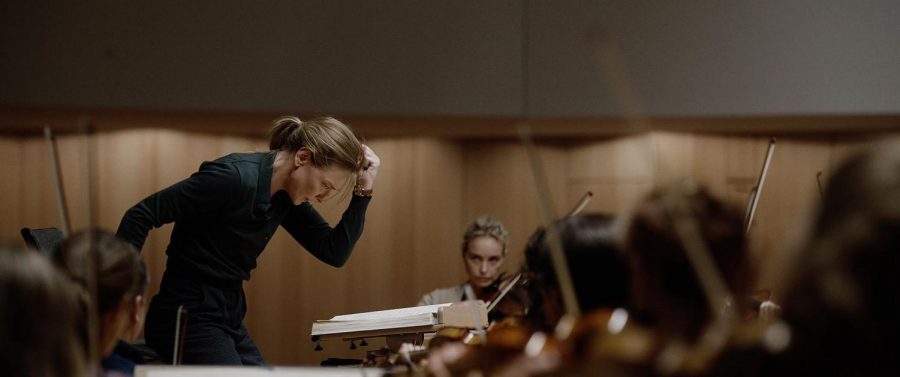Review: Todd Field brilliantly orchestrates one woman’s downfall in ‘Tár’
November 27, 2022
To say a lot has changed in the 16 years since a Todd Field feature graced the silver screen would be an understatement. During his absence, social media’s dominance has emerged, progressive movements concerned with holding bad actors accountable for their misdoings have gained considerable ground — at least online — and sociopolitical debates have erupted to an unfathomable degree.
Miraculously, writer-director Field managed to address and navigate these modern shifts — among a myriad of others — with remarkable precision, mounting intrigue and astute nuance in his latest film “Tár.”
The Focus Features release follows Lydia Tár (Cate Blanchett), a world-renowned conductor and composer, as she falls out of public favor while preparing for a live recording of Mahler’s Fifth Symphony with the Berlin Philharmonic.
Blanchett was given quite the challenge for this film, as the titular character’s descent into madness is rather demanding. The Australian actress is tasked with illustrating Lydia’s complex and often contradictory feelings. With the assistance of Field’s delicate directorial touch, though, she successfully communicates her character’s powerlessness and plight in one scene — such as when Lydia’s paranoia heightens after hearing what she believes to be a woman’s scream while jogging — before exhibiting immense confidence and control in the next — such as when Lydia directly confronts her daughter’s bully after dropping her off at school.
Beyond Blanchett’s ability to communicate her character’s wide-ranging emotions, she also perfectly captures the physicality that an accomplished composer would have. Through the waving of her baton and the gesturing of her left hand, Blanchett convincingly relays the gravitas required to corral an orchestra throughout a musical composition. This is not the only impressive physical element of her performance, however, as Blanchett’s ability to switch between languages and accents — Lydia is shown to be fluent in English, German and French — comes across as absolutely effortless.
Other standouts include Nina Hoss, Noémie Merlant and Zethphan Smith-Gneist, who play Sharon Goodnow (Lydia’s wife), Francesca Lentini (Lydia’s assistant) and Max (a Juilliard student who clashes with Lydia during a class), respectively. Any of these performers could have been easily overshadowed by the ever-imposing Blanchett but, luckily, they measure up. As a result, the trio assists greatly in establishing the palpable tension felt throughout the film’s lofty two hour and 38 minute runtime.
But, as Lydia declares while guest teaching at Juilliard: “If you want to dance the mask, you must service the composer.” Fortunately, the performers have one hell of a composer to sublimate themselves to in the Oscar-nominated auteur: Field.
Through “Tár,” the auteur behind “In the Bedroom” and “Little Children” crafts a thematically rich and thoroughly engrossing commentary on the modern social convention of cancel culture. Field, unlike other artists, refuses to portray this issue in absolutes; he refrains from assessing whether this newfound norm is beneficial or detrimental to discourse. Such abstention allows viewers to grapple with Lydia’s actions — ranging from “unwoke” opinions to credible accusations of her grooming past students — on their own terms, which, in a media landscape where works frequently spoon-feed audiences political messaging, is refreshing.
Aside from trusting his audience to form their own opinions on what they are seeing, Field has enough faith in them to make a number of bold choices in both his screenplay and direction — choices largely hinging on the viewer’s ability to follow the filmmaker along a deliberately paced and understated narrative. The film’s opening scene, for instance, is essentially 10 minutes of exposition exploring Lydia’s early life, adulthood, achievements and current endeavors. The scene is, for the most part, a single unbroken shot. Such a description may make this film’s beginning moments seem dull and tedious — and they should be. Yet, they are not. Field’s masterful writing, assured direction and unwavering belief in his audience come together to defy the odds and transform what should have been a banal introduction into something both daring and riveting in equal measure.
Further enhancing Field’s symphonic masterwork is a subtle yet cleverly utilized score by Hildur Guðnadóttir, tone-setting cinematography courtesy of Florian Hoffmeister and skillful, unobtrusive editing by Monika Willi.
From its innocuous first frame to its shocking last, “Tár” is a showcase of the awe-inspiring talent of the individuals behind it and, much like the music of Mahler or Elgar, it is sure to be remembered and celebrated for centuries to come.







